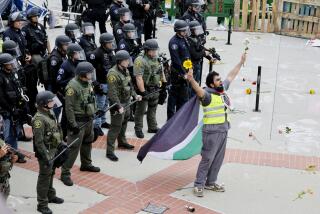Snail’s Progress in Sheriff’s Dept. : It’s still a white male bastion despite a commitment to diversity
The Los Angeles County Sheriff’s Department remains predominantly white and overwhelmingly male nearly four years after the 1992 Kolts Commission report recommended fuller integration, and in spite of Sheriff Sherman Block’s commitment to diversity. What’s taking so long?
Though Latinos have made significant gains in the uniformed ranks, blacks and women have made disappointing progress. The force is 69.5% white male today as compared with 69% four years ago, according to the semiannual follow-up report required by the investigating commission. That’s not progress.
Genderwise, the department is 86.6% male today as compared with 87.5% male in 1992. The percentage of women has inched up from 12.5% to 13.4% during the four-year period, but most of the gain is directly attributed to the Sheriff’s merger with the more diverse County Marshal’s Department. Without that merger, the Sheriff’s Department would have chalked up a net gain of one woman in four years. That’s unacceptable.
That merger also contributed to the slight increase of African American deputies, from 8.9% in 1992 to 10% today. But blacks have lost ground in the upper ranks, where only one African American holds the rank of commander and one the rank of captain.
The ranks of Asian Americans, Native Americans and homosexual officers continue to remain small in one of the most diverse regions in the nation. Why?
Sheriff Block attributes the disappointing numbers to the failure rate of women and minority recruits, and the early attrition of new minority and women deputies. Surely there must be a solution to the problems. Why is the Los Angeles Police Department better integrated?
The semiannual report by attorney Merrick Bobb, mandated in the Kolts report, keeps the pressure on the Sheriff’s Department to achieve its goals. However, integration isn’t the only area on which the department is graded. Block can take pride in the reduction of excessive force complaints, which prompted the original investigation. The LAPD has not made similar progress in this important area and should learn from Block’s stronger supervision and oversight.
Los Angeles’ most infamous excessive force complaint, the police beating of Rodney King captured on videotape five years ago this week, prompted intense scrutiny of the LAPD. The Sheriff’s Department was also investigated after The Times reported on complaints. Both departments have made progress, but both continue to fall short of what is acceptable.
More to Read
Start your day right
Sign up for Essential California for news, features and recommendations from the L.A. Times and beyond in your inbox six days a week.
You may occasionally receive promotional content from the Los Angeles Times.






